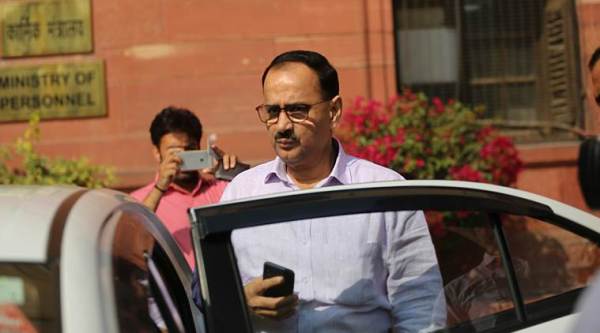 CBI Director Alok Verma on Tuesday. (Express Photo/Tashi Tobgyal)
CBI Director Alok Verma on Tuesday. (Express Photo/Tashi Tobgyal)
Moving under the cover of darkness early on Wednesday to ostensibly end the war between the two top officers of the CBI, the government stripped CBI Director Alok Verma and Special Director Rakesh Asthana of all responsibilities. And sent them on administrative leave, saying the “faction feud has reached its peak… leading to a potential loss of credibility and reputation” of the premier investigating agency.
As the government released an order from the Appointments Committee of the Cabinet headed by Prime Minister Narendra Modi and named Joint Director M Nageshwar Rao, a 1986-batch Odisha cadre IPS officer, to look after the “duties and functions” of the Director with “immediate effect” as an “interim measure”, Verma moved the Supreme Court which agreed to take up his petition Friday against the government’s decision to divest him of his powers — he has a fixed two-year tenure until February 2, 2019.
Also read | Understanding CVC, govt orders against Alok Verma
In his petition, Verma, while underlining that CBI is an independent and autonomous agency, said “there are bound to be occasions when certain investigations into high functionaries do not take the direction that may be desirable to the Government”.
Immediately after taking charge, Rao effected a major shake-up at the top, shunting out officers, the majority from teams probing bribery charges against Asthana, a Gujarat cadre IPS officer, who has been at loggerheads with Verma. Incidentally, the order by the Department of Personnel and Training said Asthana will be entitled to eligible emoluments and perks but was silent on these in the case of Verma.
Advocate Gopal Sankaranarayanan mentioned Verma’s plea before a bench of Chief Justice of India Ranjan Gogoi and Justices S K Kaul. Seeking an urgent hearing, the counsel told the court that Verma had been divested of his charge and investigating officers in some cases were also being changed.
Verma requested the court to quash the orders of the Chief Vigilance Commissioner divesting him of his powers and consequent orders passed by the Department of Personnel and Training (DoPT). The “impugned orders”, his plea said, “are manifestly arbitrary, sans natural justice and without due process thereby violating Articles 14, 19 and 21 of the Constitution”.
The petition narrated the sequence of events that led to the infighting. Verma said Asthana was appointed to the agency despite his reservations and thereafter the latter had “stymied” decisions crucial to the progress of investigations in certain cases including some monitored by the Supreme Court.
“After the appointment of Rakesh Asthana IPS as Special Director, CBI despite the pendency of cases against him and the reservations in this regard expressed by the petitioner, decisions that were crucial to the progress of certain investigations were stymied by Mr Asthana alone. Many of these concerned very sensitive cases including those monitored by this Hon’ble Court.”
He did not, however, mention the cases in his petition, saying they were “extremely sensitive”. He said he “shall however furnish the same” to the court.
The petition said in recent times, the Special Director has been of a different view regarding the course of action in some matters though all officers from the investigating officer to Superintending Officers, Joint Director and Director were in agreement.
“The hurdles posed by this individual have now been compounded by his complicity in concocting evidence to impugn the reputation of the petitioner, which has led to a separate RC (FIR) being registered by the CBI, which has been challenged by him in the High Court of Delhi,” Verma said.
He said the decision to divest him of his powers were “patently illegal”. The CBI Director, he said, has a fixed tenure of two years and was appointed by a high-powered committee comprising the Prime Minister, Leader of Opposition and Chief Justice of India, and “previous consent” of the committee is needed for his “transfer”. “The exercise of power by the impugned orders has been to bypass the mandate of the Committee,” he said.
Calling the government action an “illegal interference”, Verma said it “not only erodes the independence of the institution but also the morale of its officers”.